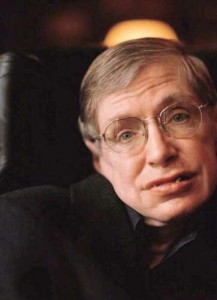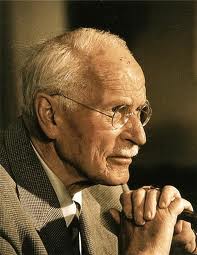“I regard the brain as a computer which will stop working when its components fail. There is no heaven or afterlife for broken down computers; that is a fairy story for people afraid of the dark.”
Perhaps the most distinguished and renowned theoretical physicist alive today, Stephen Hawking caused something of a stir recently when in an interview with England’s Guardian newspaper he included the above statement in answer to the question “What, if anything, do you fear about death?” This follows on the heels of his assertion last year that the universe exists and operates according to fixed discernable laws and therefore need not have been put in motion by a creator, a.k.a. God. The present Mythfire post takes up the more recent of Hawking’s two claims and compares it with those made by C.G. Jung in “On Life after Death,” a chapter in the latter’s autobiographical Memories, Dreams, Reflections.[1]
On certain key points these two intellectual giants seem to be in complete agreement. Most basically, perhaps even obviously, Jung agrees with Hawking that the physical body – including the brain – does not survive beyond the point of death. Jung also believes that because of our understanding of the afterlife we must – as Hawking states in answer to another question – “seek the greatest value of our action.” And yet, of course, it is with this understanding of the afterlife that the two great men diverge.
While Hawking seemingly leaves no possibility for the existence of an afterlife, Jung begins his chapter “On Life after Death” by admitting his own reluctance to consider such an idea:
“It is not that I wish we had a life after death. In fact, I would prefer not to foster such ideas. Still, I must state, to give reality its due, that without my wishing and without my doing anything about it, thoughts of this nature move about within me. I can’t say whether these thoughts are true or false, but I do know they are there, and can be given utterance, if I do not repress them out of some prejudice. Prejudice cripples and injures the full phenomenon of psychic life.”[2]
In other words, when discussing the afterlife (or for that matter other phenomena such as dreams, synchronicity, etc.) we need to begin with an awareness of our own prejudices. Prejudicial ways of thinking and perceiving stem less from the “reality” we see around us than from our own conditioning and life experiences. More to the point and apropos of the present post, our prejudices regarding these non-rational matters so often evolve out of our reliance on the rational/scientific mindset which has dominated the collective discourse these last few “Enlightened” centuries, a fact Jung also notes:
“Critical rationalism has apparently eliminated, along with so many other mythic conceptions, the idea of life after death. This could only have happened because nowadays most people identify themselves almost exclusively with their consciousness, and imagine that they are only what they know about themselves….Rationalism and doctrinairism are the disease of our time; they pretend to have all the answers.” [3]
To be sure, if Jung were sitting across from Hawking in a point-counterpoint type of conversation no suggestion would be made by the former that critical rationalism should itself be eliminated. However, it does need to be expanded:
“Mathematics goes to great pains to create expressions for relationships which pass empirical comprehension. In much the same way, it is all-important for a disciplined imagination to build up images of intangibles by logical principles and on the basis of empirical data, that is, on the evidence of dreams.”[4]
It is interesting to consider this quote in light of the answer Hawking poses to the first of the Guardian interviewer’s questions: “What is the value in knowing ‘Why are we here?’” Here is Hawking’s reply:
“The universe is governed by science. But science tells us that we can’t solve the equations, directly in the abstract. We need to use the effective theory of Darwinian natural selection of those societies most likely to survive. We assign them higher value.”
While Mythfire does not claim to fully comprehend Hawking’s answer it would seem that looked at broadly he is saying much the same as Jung in the second sentence of the “disciplined imagination” quote. In Hawking’s case, science is the disciplined imagination by which we “build up images of intangibles by logical principles,” and to the extent that any gaps or uncertainties exist in our equation-solving other sources of empirical data need to be turned to as potential or plausible, i.e. “effective” filler. For Hawking and the question of the value of life, this data can be found in Darwin’s theory of natural selection; for Jung and the question of the value of the afterlife, this empirical data can be found in dreams and other psychic phenomena which offer what Jung calls “slender hints of the unknowable.”[5]
In his chapter, Jung includes at least ten relevant instances of these empirical data “hints” in the form of dreams, synchronicities, and premonitions. One example involves Jung’s long-deceased father appearing to him in a dream asking for marriage counseling. At the time Jung did not know what to make of this dream visitation. Only when Jung’s mother passed away several months later did the dream’s meaning come into focus. [6]
Here is another longer example Jung offers for consideration:
“Not only my own dreams, but also occasionally the dreams of others, helped to shape, revise, or confirm my views on a life after death. I attach particular importance to a dream which a pupil of mine, a woman of sixty, dreamed about two months before her death. She had entered the hereafter. There was a class going on, and various deceased women friends of hers sat on the front bench. An atmosphere of general expectation prevailed. She looked around for a teacher or lecturer, but could find none. Then it became plain that she herself was the lecturer, for immediately after death people had to give accounts of the total experience of their lives. The dead were extremely interested in the life experiences that the newly deceased brought with them, just as if the acts and experiences taking place in earthly life, in space and time, were the decisive ones.” [7]
Again, as with Hawking, Jung, too, believes that we should “seek the greatest value of our action” while alive. Ironically, Hawking takes this viewpoint because he doesn’t believe in an afterlife and Jung because he does. These and other experiences convinced Jung that in addition to the dimensions of space and time of which we are conscious there is at least one space-less, timeless dimension of which we are mostly unaware or unconscious – at least until (and possibly to a certain extent even after) our deaths. And yet we are able and even obligated to add something by our actions here and now to the general knowledge and completeness of this life after/life.
In short, Jung’s experiences provided enough empirical data for him to formulate a “hypothesis” of the afterlife which he freely admitted could not be proven. However, just as on the outer physical plane Hawking’s Darwinian theory of natural selection was turned to because “effective,” so too on the inner psychological plane is the similarly unprovable hypothesis of heaven turned to for its own effective qualities, especially those of a healing nature. [8] To put it differently and return to the opening quote, Hawking dismisses the idea of heaven as a “fairy story”; Jung says that the idea or hypothesis of heaven is important in small part because it is a fable or fairy story:
“Unfortunately, the mythic side of man is given short shrift nowadays. He can no longer create fables. As a result, a great deal escapes him; for it is important and salutary to speak also of incomprehensible things. Such talk is like the telling of a good ghost story, as we sit by the fireside and smoke a pipe.” [9]
Jung goes on to reiterate that – prevalent across all times and cultures – such mythologizing or story-telling is “a healing and valid activity” and “gives existence a glamour which we would not like to do without.” He finishes by saying: “Nor is there any good reason why we should.” [10]
Interestingly, Hawking’s interview with Guardian hit the press the same week that results of a “huge” new study were published in London. Co-directed by Professor Roger Trigg of Oxford University, the three-year project “incorporated more than 40 different studies by dozens of researchers looking at countries from China to Poland and the United States to Micronesia.” Essentially, these researchers concluded that ideas such as the existence of God, of divine agency and purpose in the universe, and the idea or hypothesis of the afterlife are all “universal, prevalent, and deep-rooted.” Trigg states: “If you’ve got something so deep-rooted in human nature, thwarting it is in some sense not enabling humans to fulfill their basic interests.”[11]
If Jung’s hypothesis of heaven is correct, then in the final analysis the fulfillment of these basic interests is germane to both mortals and “immortals” alike. Readers are encouraged to (re-) visit Jung’s Memories, Dreams, Reflections for more.
——
Note: A YouTube clip of Jung addressing several of the above ideas can be found here: http://www.youtube.com/watch?v=T-Ab3tlpvYA&feature=feedrec_grec_index. Also, similar to Jung’s “hints,” his colleague Marie-Louise von Franz discusses “speculations” about death and “glimpses” into the afterlife in an exceptional 1978 talk entitled “Archetypal Experiences Surrounding Death.” A recording of the talk was made available on CD for the first time last month and can be purchased here.
—–
Next Monday: “Copulative Conjuctions & Other Natural Phenomena”
[2] Jung, C.G. Memories, Dreams, Reflections. Recorded and edited by Aniela Jaffe. New York: Vintage Books, 1989: 299. Italics added. MDR was originally published in 1963.
[3] Ibid., 300. Italics added.
[4] Ibid., 310.
[5]Ibid., 322. Jung repeatedly uses the word “hints” in the chapter under discussion. See also pgs. 301, 302, 303, 304, 312, and 316.
[6] Ibid., 315.
[7] Ibid., 305. Italics added.
[8] Jung uses the word “hypothesis” on pages 301 and 302.
[9] Ibid., 301. An earlier Mythfire post discussed the idea of imagination in terms that are pertinent to the present discussion. Footnote #3 in the same post specifically references the vital role fairy stories (or tales) as well as myths play in our lives.
[10] Ibid., 301-2.





I found this article to be useful. I am a scientist that is beginning to scratch the surface of Jung.
Thanks for reading, Moriah. I appreciate you taking the time to comment.
This neatly addresses a stirring that has filled me with wonder and consternation since childhood. Feelings of derealization, anxiety, and isolation come along with the possibility that this consciousness might be the only one I ever have the privilege of experiencing– but then, I remind myself that I have experienced many different lenses of consciousness in this life alone (some far more positive than others). Humans are able, both, to create and witness an infinite number of realities. I know that an immortal component exists, because I have experienced it. Thank you for this insightful blog.
Hi Erika,
Great comment! In reflecting on how I might respond a somewhat infamous BBC interview with Jung came to mind. In it he is asked if he believes in God. He replies “I don’t need to believe. I know.” I just came across a well-written blog post that addresses this reply in a way that (to me) resonates with your comment. You can check out the post here: http://steve.myers.co/jungs-regret-over-i-dont-need-to-believe-i-know/. The original BBC exchange and entire interview are also quite easy to find online. Thanks again for commenting…